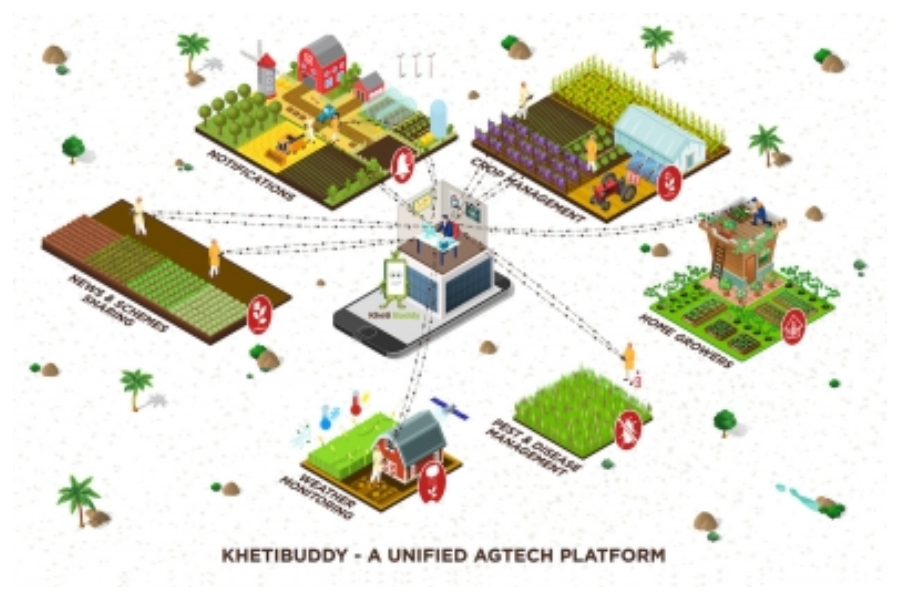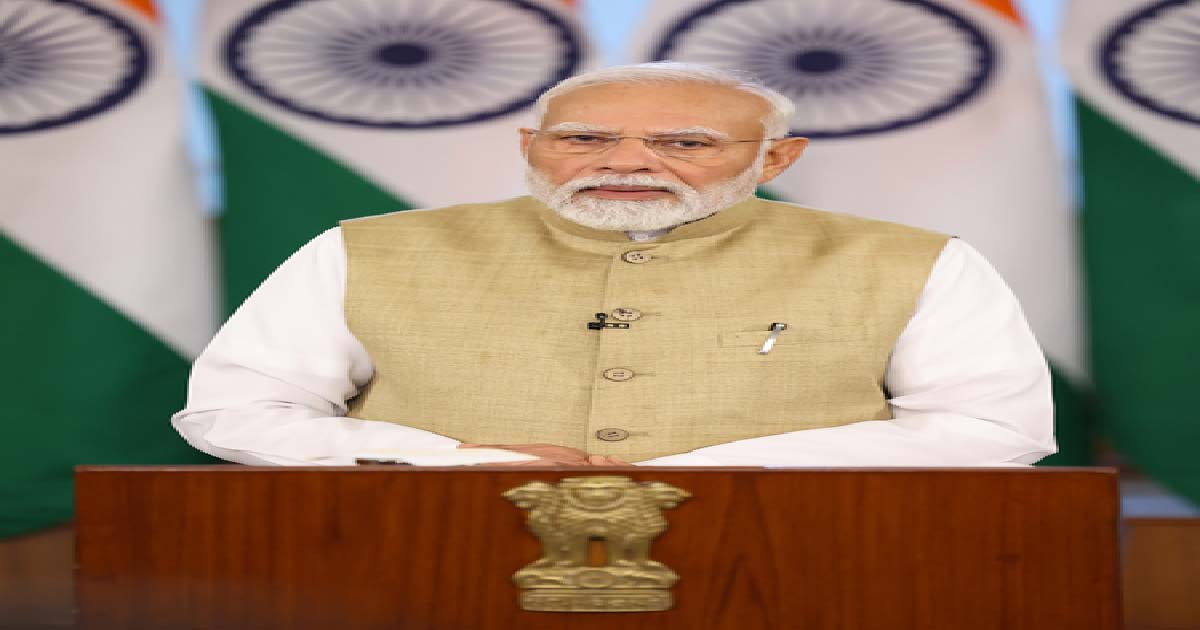Business
Empowering farmers with easy to consume tech need of the hour: Khetibuddy CEO

Fuelled by new-age technologies like drone surveillance, remote sensing and artificial intelligence (AI)-driven solutions, India’s agritech market has the potential to reach $30-$35 billion by 2025.
One of the key challenges faced by the agri-businesses is that there are very few software platforms available which have an agri-first approach, and can help them improve the farming process, increase yield and reduce cost or achieve sustainability.
Vinay Nair, Co-founder and CEO, Khetibuddy which is a Unified Agtech platform that strengthens digital infrastructure of agribusinesses, tells IANS that remote sensing, internet of things (IoT) and use of AI/ML have huge applications in agriculture and the need of the hour is make the technology agri-specific and easy to use.
Here are the excerpts from his interview:
Q: Tell us more about your Unified Agtech platform and how it empowers agri-businesses across India?
A: Industries have flourished once they have access to data related to their business. Agricultural data possesses the power to transform agribusinesses. Agri-domain experts have now realized this and are embracing the future with digitization.
One of the key challenges faced by agri-businesses today in doing so, is that there are very few software platforms which are available which have an agri-first approach. Major agribusinesses either rely on customizing large ERP or rely on available farm management applications which have the challenges and limitations in customizing to suit their requirement.
It is this gap which we are trying to address through our Unified agtech platform. Khetibuddy’s Agtech platform which is a SaaS (software-as-a-service) offering, allows agri-businesses to monitor, measure and manage their farms, farmers and the entire agri value chain. It’s a suite of modules from farm management, remote sensing, pest management, m-commerce to mention a few.
Any organisation who is in the business of serving farmers can use the platform based on their goals. However, unlike other players, Khetibuddy is unique by providing the science behind the tech as well. We provide ready-to-use crop schedules and advisory, which can be customized based on the local conditions with integration to weather, soil and satellite data sources.
If the goal of an agri-business is improving farming process, increasing yield, reducing cost or achieving sustainability then all of these goals can be facilitated through our SAAS platform.
Q: How are you leveraging AI/ML to help farmers make better informed decisions?
A: We use computer vision for pest and disease detection. What we have done differently is enable agribusinesses to take over on the model’s learning curve for pests and diseases relevant to their geography with minimal efforts. Our models are easier to train even by non-technical teams from agribusinesses. We developed models for specific crops for early pest and disease detection.
Importantly, we took a hybrid approach for developing continuous model learning mode with support from experienced entomologists in our team with a clear goal of avoiding crop loss.
We are also using ML for statistical modelling methods through which we estimate yields and currently working on detecting crop grown at a cluster/district or state level through remote sensing. These insights help private and public organizations to plan their services accordingly. We have already started working on some of these areas with some government units like Krishi Vigyan Kendra (KVK).
Q: What are some of the emerging technologies that you are most excited about over the medium term (3-5 years) in the agritech space?
A: Covid taught us to use technology to continue business as usual. If you are not able to visit the farms how do we ensure we serve the farmers, which include remote farm management through remote sensing, audio/video calls , have automated advisory services, build data models which help in predicting patterns. Remote sensing, IOTand use of AI/ML have huge applications in agriculture. The need of the hour is to make the technology agri specific and easy to use and consume at the ground level.
Q: You recently announced the launch of a dedicated premium gardening app for your home platform. What is your vision behind this and how has the user response been to this feature?
Did you know that by spending only 15 minutes a day you can grow 60 per cent of the food you consume daily right in your balcony or terrace? That’s what the app under the brand name ‘Khetibuddy Home’ helps you do.
Right from selection of places and inputs to what care you need to take every day to grow food at home, this app can be your gardening guide. Our mission here was to encourage urban people to take up growing some food at home and contribute towards self-sustainability.
We also have curated training courses dedicated only for passionate gardeners through a learning portal which also helps first time gardeners to take up gardening. Since last year, we have on�boarded more than 50,000 home growers on our platform. Now, we have added premium services for a fun and personalized gardening experience. While we work on the larger cause with farmers this allows people in urban cities to also be partially self-sustainable by growing food from food.
Q: You were born in a cloud organisation. What does cloud technology allow you to do better?
A: With the increase of broadband and 4G across rural India, Cloud helps in the reach. We no longer have to worry about local infrastructure as long as you have the internet, the technology is accessible which was not the case earlier. Today, B2B has to follow the B2C experience, I call it the ‘touch generation’. Every consumer needs all services at their fingertip. This is only possible with technologies like cloud and mobile, so businesses also should be provided such services and not use old technology.
AWS has been a great strategic partner. We grew from 0-1 lakh users and we could plan to scale the platform whenever needed which kept our costs in control with our multi-tenant architecture on AWS. AWS helps us to give a promise of uptime to our customers with their always on services.
Customers have the comfort when they know we are on AWS which is a great help. Today, we have a number of servers on production, development, which we use and a variety of technology stack, if this infrastructure had to be maintained by us, our time to be market ready would have increased at least by 2 times. We can focus on our development and not worry about infrastructure needs.
Business
New labour codes to boost formalisation, gender parity of India’s workforce: Industry leaders

New Delhi, Nov 22: India’s top industry bodies and staffing leaders on Saturday labelled the implementation of the Four Labour Codes a landmark step toward formalising the workforce, expanding social security, and aligning India’s labour framework with global standards.
The India Electronics & Semiconductor Association (IESA) said the reforms would significantly benefit the high-technology sectors by enhancing workforce stability, improving safety standards, and enabling labour flexibility with social protection.
“Mandatory appointment letters, universal minimum wages, and pan-India social security coverage (including ESIC expansion) ensure greater formalisation. This strengthens worker confidence — critical for skill-intensive manufacturing such as fabs, ATMP, component manufacturing and design centres,” said Ashok Chandak, President, IESA and SEMI India.
Provisions for fixed-term employment, faster dispute resolution, single licensing, and simplified compliance directly support the scaling of high-tech manufacturing clusters, the statement said.
Meanwhile, parity of benefits for Fixed-Term Employees (FTE) and expanded social security protections ensure a balanced, worker-centric ecosystem, he added.
Sachin Alug, CEO of NLB Services, a technology and digital talent provider, said the reforms were long overdue for India’s gig economy and will offer protection to a fast-growing but previously unorganised workforce.
The new laws are also expected to promote gender parity in the workforce by opening doors to wider opportunities across diverse sectors. Additionally, other groups such as”
He also pointed out that new laws will promote gender parity and contract workers, youth workers, and fixed-term employees will benefit from clearer working-hour norms, expanded social security, minimum wage protections, and health benefits.
“By simplifying compliance and unifying the regulatory framework, the codes can significantly expand formal employment, bringing millions of workers, especially in industries that rely on contract, temporary, and project-based roles, into the fold of structured, protected work,” said Balasubramanian A, Senior Vice President, TeamLease Services.
“National floor minimum wage creates a consistent benchmark across states and is an important step in India’s evolution from a minimum-wage economy to a living-wage economy,” he noted.
Suchita Dutta, Executive Director of Indian Staffing Federation (ISF), said the codes simplify compliance for employers, reduce regulatory burdens, and foster a more flexible hiring environment — crucial for the staffing industry, which has long advocated for such changes to unlock formal job creation.
The government, on November 21, implemented the Four Labour Codes — the Code on Wages (2019), Industrial Relations Code (2020), Code on Social Security (2020), and Occupational Safety, Health and Working Conditions (OSHWC) Code (2020) — repealing and rationalising 29 existing central labour laws.
Business
Nifty, Sensex continue rally for second week despite FII outflows

Mumbai, Nov 22: Indian equity benchmarks made marginal gains for the second week, supported by stronger second quarter (Q2) earnings, easing inflation and optimism around the India-US trade negotiations.
Benchmark indices Nifty and Sensex edged higher 0.68 and 0.50 per cent during the week to close at 26,068 and 85,231, respectively.
Analysts said that a moderation in FII selling due to expectations of earnings upgrades in H2 FY26 also supported the rally. However, markets turned volatile on Friday amid weak global cues. The Nifty fell after failing to cross its previous all-time highs of 26,277, ending its two-day advance.
Broader indices underperformed, with the Nifty Midcap100 and Smallcap100 ending the week down 0.76 per cent and 2.2 per cent, respectively.
Though IT stocks faced selling pressure due to weakness in the US tech shares, it was the biggest weekly gainer. Nifty Auto and Services followed as the secoral gainers during the week. On Friday, metals and realty were the worst hit, both dropping over 2 per cent, followed by PSU banks, financial services and media.
A better-than-expected non-farm payroll dimmed hopes of a US Federal Reserve rate cut in December putting pressure on global equities. Resultantly gold also witnessed selling pressure while INR declined to a new low.
The oil prices declined due to the US’s renewed push for a Russia-Ukraine peace proposal.
“The market may witness some profit booking in the near term if the pressure on Indian rupee persists. In the week ahead, investors will also have a close vigil on trade developments and economic data like IIP and Q2 FY26 GDP data to get the market direction,” said Vinod Nair, Head of Research, Geojit Investments Limited.
Analysts said that they expect markets to remain firm next week supported by buying on dips, improving demand outlook in Q3 and resilient flows.
Business
Four Labour Codes are most progressive reforms for workers since Independence: PM Modi

New Delhi, Nov 21: Prime Minister Narendra Modi on Friday said the government has given effect to the Four Labour Codes, which are one of the most comprehensive and progressive labour-oriented reforms since Independence.
“It greatly empowers our workers. It also significantly simplifies compliance and promotes Ease of Doing Business,” the Prime Minister remarked.
He said that these Codes will serve as a strong foundation for universal social security, minimum and timely payment of wages, safe workplaces and remunerative opportunities for our people, especially ‘Nari Shakti and Yuva Shakti’.
“It will build a future-ready ecosystem that protects the rights of workers and strengthens India’s economic growth. These reforms will boost job creation, drive productivity and accelerate our journey towards a Viksit Bharat,” he added.
The four labour codes include the Code on Wages, 2019, the Industrial Relations Code, 2020, the Code on Social Security, 2020 and the Occupational Safety, Health and Working Conditions Code, 2020, with effect from November 21, rationalising 29 existing labour laws.
With the implementation of the Labour Codes, it has now become mandatory for employers to issue appointment letters to all workers, which provides written proof to ensure transparency, job security, and fixed employment. Earlier, no mandatory appointment letters were required.
Under Code on Social Security, 2020, all workers, including gig and platform workers, will get social security coverage. All workers will get PF, ESIC, insurance, and other social security benefits. Earlier, there was only limited security coverage.
Under the Code on Wages, 2019, all workers will receive a statutory right minimum wage payment which wages and timely payment will ensure financial security. Earlier, minimum wages applied only to scheduled industries or employments; large sections of workers remained uncovered.
The Labour codes also ensure that employers must provide all workers above the age of 40 years with a free annual health check-up and promote a timely preventive healthcare culture. Earlier, there was no legal requirement for employers to provide free annual health check-ups to workers.
The codes also make it mandatory for employers to provide timely wages, to ensure financial stability, reducing work stress and boosting the overall morale of the workers. Earlier, there was no mandatory compliance for employers’ payment of wages.
The new law permits women to work at night and in all types of work across all establishments, subject to their consent and required safety measures. Women will also get equal opportunities to earn higher incomes in high-paying job roles. Earlier, women’s employment in night shifts and certain occupations was restricted.
The new codes also extend ESIC coverage and benefits pan-India – voluntary for establishments with fewer than 10 employees, and mandatory for establishments with even one employee engaged in hazardous processes.
Social protection coverage will be expanded to all workers. Earlier, ESIC coverage was limited to notified areas and specific industries; establishments with fewer than 10 employees were generally excluded, and hazardous-process units did not have uniform mandatory ESIC coverage across India.
The codes also ease the compliance burden for workers by providing for single registration, a PAN-India single license and a single return. Earlier, multiple registrations, licenses and returns across various labour laws were required.
-

 Crime3 years ago
Crime3 years agoClass 10 student jumps to death in Jaipur
-

 Maharashtra1 year ago
Maharashtra1 year agoMumbai Local Train Update: Central Railway’s New Timetable Comes Into Effect; Check Full List Of Revised Timings & Stations
-

 Maharashtra1 year ago
Maharashtra1 year agoMumbai To Go Toll-Free Tonight! Maharashtra Govt Announces Complete Toll Waiver For Light Motor Vehicles At All 5 Entry Points Of City
-

 Maharashtra1 year ago
Maharashtra1 year agoFalse photo of Imtiaz Jaleel’s rally, exposing the fooling conspiracy
-

 National News1 year ago
National News1 year agoMinistry of Railways rolls out Special Drive 4.0 with focus on digitisation, cleanliness, inclusiveness and grievance redressal
-

 Maharashtra1 year ago
Maharashtra1 year agoMaharashtra Elections 2024: Mumbai Metro & BEST Services Extended Till Midnight On Voting Day
-

 National News1 year ago
National News1 year agoJ&K: 4 Jawans Killed, 28 Injured After Bus Carrying BSF Personnel For Poll Duty Falls Into Gorge In Budgam; Terrifying Visuals Surface
-

 Crime1 year ago
Crime1 year agoBaba Siddique Murder: Mumbai Police Unable To Get Lawrence Bishnoi Custody Due To Home Ministry Order, Says Report












